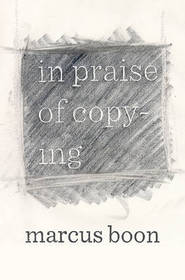 Just a quick fyi: If you head over to the Harvard University Press web site, you can grab a free copy of Marcus Boon’s new book, In Praise of Copying, which makes the case that “copying is an essential part of being human, that the ability to copy is worthy of celebration, and that, without recognizing how integral copying is to being human, we cannot understand ourselves or the world we live in.” Boon is a writer, journalist and Associate Professor in the English Literature department at York University, Toronto. You can download a free copy of his book in PDF format straight from this link. (Note that the text is formally released under a Creative Commons license.) Or you can always purchase a printed copy online.
Just a quick fyi: If you head over to the Harvard University Press web site, you can grab a free copy of Marcus Boon’s new book, In Praise of Copying, which makes the case that “copying is an essential part of being human, that the ability to copy is worthy of celebration, and that, without recognizing how integral copying is to being human, we cannot understand ourselves or the world we live in.” Boon is a writer, journalist and Associate Professor in the English Literature department at York University, Toronto. You can download a free copy of his book in PDF format straight from this link. (Note that the text is formally released under a Creative Commons license.) Or you can always purchase a printed copy online.
P.S. The University of Chicago Press is offering up a free e‑book of its own: The Bourgeois Virtues (632 pages) by Deirdre N. McCloskey. Head here to get a copy.


What a book! Here’s a taste:
“In a text addressing his former comrades in the Popular Front, Bataille opposed appropriation to excretion–excretion as the inevitable loss of that which has been accumulated, as that which must be disposed of. He argued that any concept of revolution that consisted solely of a transfer of rights of appropriation was inadequate, and that the real revolutionary project was that of organizing extravagant projects of waste disposal that go beyond the traditional methods of scapegoating, war, etc. This remains our problem today, and it suggests profound reasons why there are limits to any legal resolution of problems of copying.”
To grasp the profundity, of course, you’ll have to read the book. In the meantime here’s a finely balanced passage–the parentheses are from the original:
“One could say that what we call ‘property’ is merely the consequence of thuggish enforcement strategies propagated by a gang of robber barons who have the power to enforce their claims and, through brute force, establish them as law even when they are illegitimate or false; but although this notion has some appeal, it also has major weaknesses. Our common experience of the world is not complete and arbitrary chaos, and when we look at a tree, although we can recognize the impermanence of the tree–the fact that it grows, changes with the seasons, eventually dies–we nevertheless feel that a tree is not a bird or an ocean, nor could we call an ocean a copy of a tree (or could we?). The tree is established by an act of labeling that is an appropriation, yet we recognize a certain properness in calling a tree a tree.”
The book is well worth the asking price. Enjoy.